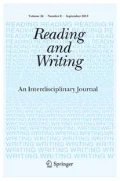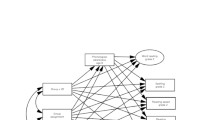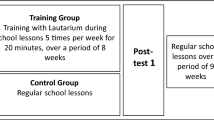Abstract
The aim of our study was to determine the effect of training of phonological abilities upon the acquisition of reading and writing during the first year of primary school. An experimental design, with five groups of subjects matched by age, sex, IQ, phonological abilities and reading and writing level was used. Every group received twenty training sessions, over a period of six months. Four groups had different training procedures depending upon the type of task used (phoneme versus concept discrimination) and the way that the task was carried out (using or not using manipulative materials). The fifth group served as control. Post training measures were taken in reading, writing, and mathematics, besides the teacher's estimated scores, twice: immediately after the end of training sessions and two months later. Significant effects on both reading and writing measures were obtained for the groups trained on phonological activities using manipulative materials. The effects were reliable for the two tests. The theoretical implications of the results are discussed and their implications for educational practice are indicated.
Similar content being viewed by others
References
Alegria, J., Pignot, E. & Morais, J. (1982). Phonetic analysis of speech and memory codes in beginning readers,Memory & Cognition 10: 451–456.
Ball, E. W. & Blachman B. A. (1991). Does phoneme awareness training in kindergarten make a difference in early word recognition and developmental spelling?,Reading Research Quarterly 24: 49–66.
Williams, J. P. (1979). The ABD's of reading: A program for the learning-disabled. In: L. B. Resnick & P. A. Weaver (eds.),Theory and practice of early reading. Vol. 3 (pp. 179–196). Hillsdale, NJ: Earlbaum.
Williams, J. P. (1980). Teaching decoding with an emphasis on phoneme analysis and phoneme blending,Journal of Educational Psychology 72: 1–15.
Yopp, H. K. (1988). The validity and reliability of phonemic awareness tests,Reading Research Quarterly 23: 159–177.
Zifcak, M. (1981). Phonological awareness and reading acquisition,Contemporary Educational Psychology 6: 117–126.
Baron, J. & Treiman R. (1980). Use of orthography in reading and learning to read. In: J. F. Kavanagh & R. L. Venezky (eds.),Orthography, Reading, and Dyslexia (pp. 171–189). Baltimore: University Park Press.
Beck, I. L. (1981). Reading problems and instructional practices. In: G. C. Mackinnon & T. G. Waller (eds.),Reading Research: Advances in Theory and Practice (pp. 55–95). New York: Academic Press.
Bertelson, P., Morais, J., Alegria, J. & Content, A. (1985). Phonetic analysis capacity and learning to read,Nature 313: 73–74.
Bradley, L. (1980).Assessing reading difficulties: A diagnostic and remedial approach. London: MacMillan.
Bradley L. (1988). Making connections in learning to reading and to spell,Applied Cognitive Psychology 2: 3–18.
Bradley, L. & Bryant, P. (1983). Categorising sounds and learning to read — a casual connection.Nature 301: 419–421.
Bradley, L. & Bryant, P. (1985).Rhyme and reason in reading and spelling. Ann Arbor: The University of Michigan Press.
Bruck, M. & Waters, G. (1988). An analysis of the spelling errors of children who differ in their reading and spelling skills,Applied Psycholinguistics 9: 77–92.
Bryant, P. & Bradley, L. (1985). Bryant and Bradley Reply,Nature 313: 74
Bryant, P. E., Bradley, L., Maclean, M. & Crossland, J. (1989). Nursery rhymes, phonological skills and reading,Journal of Child Language 16: 407–428.
Bryant, P. E. & Goswami, U. (1987). Beyond grapheme-phoneme correspondence,Cahiers de Psychologie Cognitive.European Bulletin of Cognitive Psychology 7: 439–443.
Bryant, P. E., Maclean, M., Bradley, L. & Crossland, J. (1990). Rhyme and alliteration, phoneme detection, and learning to read,Developmental Psychology 26: 429–438.
Cabrera, F. (1985).Pruebas Diagnósticas de Lectura: Primero de E.G.B. Barcelona: CEAC.
Calfee, R. C. (1977): Assessment of individual reading skills: Basic research and practical applications. In: A. S. Reber & D. L. Scarborough (eds.),Toward a psychology of reading (pp. 289–323). Hillsdale, NJ: Earlbaum.
Calfee, R. C., Chapman, R. S. & Venezky, R. L. (1972). How a child needs to think in order to learn to read. In: L. Gregg (ed.),Cognition in Learning and Memory (pp. 139–182). New York: Wiley.
Calfee, R. C., Lindamood, P. & Lindamood, C. (1973): Acoustic-phonetic skills and reading-kindergarten through twelfth grade,Journal of Educational Psychology 64: 293–298.
Chall, J. S. (1967):Learning to Read: The Great Debate. New York: MacGraw-Hill.
Chall, J. S. (1979): The great debate: Ten years later, with a modest proposal for reading stages. In: L. B. Resnick & P. L. Weaver (eds.),Theory and Practice of Early Reading, Vol. 1 (pp. 29–56). Hillsdale, NJ: Earlbaum.
Chall, J. S. (1983).Learning to Read: The Great Debate, Updated Edition. New York: MacGraw-Hill.
Content, A., Kolinsky, R., Morais, J. & Bertelson, P. (1986). Phonetic segmentation in prereaders: Effect of corrective information,Journal of Experimental Child Psychology 42: 49–72.
Ehrl, L. C. (1980). The development of orthographics images. In: U. Frith (ed.),Cognitive Processes in Spelling (pp. 311–338). London: Academic Press.
Ehri, L. C. & Wilce, L. S. (1979). The mnemonic value of orthography among beginning readers,Journal of Educational Psychology 71: 26–40.
Ehrl, L. C. & Wilce, L. S. (1980). The influence of orthography in readers conceptualization of the phonemic structure of words,Applied Psycholinguistics 1: 371–385.
Evans, M., Taylor, N. & Blum, I. C. (1979). Children's written language awareness and its relation to reading acquisition,Journal of Reading Behavior 11: 7–19.
Fox, B. & Routh, D. K. (1976). Phonemic analysis and synthesis as word-attack skills,Journal of Educational Psychology 68: 70–74.
Fox, B. & Routh, D. K. (1984). Phonemic analysis and synthesis as word attack skills: Revisited,Journal of Educational Psychology 76: 1059–1064.
Frith, U. (1980): Unexpected spelling problems. In: U. Frith (ed.),Cognitive processes in spelling (pp. 495–516). London: Academic Press.
Gleitman, L. R. & Rozin, P. (1977). The structure and acquisition of reading, I: Relations between orthographies and the structure of language. In: A. Reber & D. Scarborough (eds.),Toward a psychology of reading: The proceedings of the cluny conference (pp. 1–53). Hillsdale, NJ: Earlbaum.
Hogaboam, T. & Perfetti, Ch. A. (1978): Reading skill and the role of verbal experience in decoding,Journal of Educational Psychology 70: 717–729.
Hohn, W. E. & Ehri, L. C. (1983). Do alphabet letters help prereaders acquire phonemic segmentation skill?,Journal of Educational Psychology 75: 752–762.
Johnson, D. D. & Baumann, J. F. (1984): Word identification. In: P. D. Pearson, R. Barr, M. Kamil & P. Mosenthal (eds.),Handbook of reading research (pp. 583–608). New York: Longman.
Just, M. A. & Carpenter, P. A. (1987):The psychology of reading and language comprehension Boston, MA: Allyn & Bacon.
Justicia, F. (1985).El vocabulario usual del niño en el Ciclo Inicial y en el Ciclo Medio de la E.G.B. Granada: I.C.E. de la Universidad de Granada.
Laberge, D. & Samuels, S. J. (1974). Toward a theory of automatic information processing in reading. In: H. Singer & R. Ruddell (1985),Theoretical models and processes of reading (pp. 689–718). Delaware: International Reading Association and Hillsdale, NJ: Earlbaum.
Lewkovicz, N. K. & Low, L. Y. (1979). Effects of visual aids and word structure on phonemic segmentation,Contemporary Educational Psychology 4: 238–252.
Liberman, I. Y. (1973). Segmentation of the spoken word and reading acquisition,Bulletin of the Orton Society 23: 65–77.
Liberman, I. Y. & Shankweiler, D. (1979). Speech, the alphabet and teaching to read. In: L. B. Resnick & P. A. Weaver (eds.),Theory and Practice of Early Reading, Vol. 2 (pp. 109–134). Hillsdale, NJ: Earlbaum.
Lie, A. (1991). Effects of a training program for stimulating skills in word analysis in first-grade children,Reading Research Quarterly 26: 235–250.
Lundberg, I., Frost, J. & Petersen, O. (1988). Effects of an extensive program for stimulating phonological awareness in preschool children,Reading Research Quarterly 23: 263–268.
Lundberg, I., Olofsson, A. & Wall, S. (1980). Reading and spelling skills in the first school years predicted from phonemic awareness skills in kindergarten,Scandinavian Journal of Psychology 21: 159–173.
Lundberg, I. & Torneus, M. (1978). Non reader's awareness of the basic relationship between spoken and written words,Journal of Experimental Child Psychology 25: 404–412.
Mann, V. (1984). Longitudinal prediction and prevention of early reading difficulty,Annals of Dyslexia 34: 1984.
Mann, V. A. (1986): Phonological awareness: the role of reading experience,Cognition 24: 65–92.
Mann, V. & Ditunno, P. (1990). Phonological deficiencies: Effective predictors of future reading problems. In: G. Pavlidis (ed.),Perspectives on Dyslexia, Vol. 2Cognition, Language and Treatment (pp. 105–130). Chichester: Wiley & Sons.
Mann, V. & Liberman, I. Y. (1984). Phonological awareness and verbal short-term memory,Journal of Learning Disabilities 17: 592–599.
Morais, J. (1991). Constraints on the development of phonological awareness. In: D. J. Sawyer & B. J. Fox (eds.),Phonological awareness in reading: The evolution of current perspectives (pp. 31–72). New York: Springer Verlag.
Morais, J., Alegria, J. & Content, A. (1987a). The relationships between segmental analysis and alphabetic literacy: An interactive view,Cahiers de Psychologie Cognitive. European Bulletin of Cognitive Psychology 7: 415–438.
Morais, J., Alegria, J. & Content, A. (1987b): Segmental awareness: respectable, useful, and almost always necessary,Cahiers de Psychologie Cognitive. European Bulletin of Cognitive Psychology 7: 530–556.
Morais, J., Bertelson, P., Cary, L. & Alegria, J. (1986). Literacy training and speech segmentation,Cognition 24: 45–64.
Morais, J., Cary, L., Alegria, J. & Bertelson, P. (1979). Does awareness of speech as a sequence of phones arise spontaneously?Cognition 7: 323–331.
Nieto, M. E. (1984).Exploración del nivel lingüístico en edad escolar (Prueba de Lenguaje Oral M.E.N.H.). México: Méndez.
Perfetti, C. A. (1985).Reading Ability. New York: Oxford University Press.
Perfetti, C. A., Beck, I., Bell, L. C. & Hughes, C. (1987). Phonemic knowledge and learning to read are reciprocal: A longitudinal study of first grade children,Merrill-Palmer Quarterly 33: 283–219.
Perfetti, C. A. & Hogaboam, T. (1975). The relationship between single words decoding and reading comprehension skill,Journal of Educational Psychology 67: 461–469.
Perin, D. (1983). Phonemic segmentation and spelling,British Journal of Psychology 74: 129–144.
Quilis, A. & Fernandez, J. (1966).Curso de fonética y fonología españolas. Madrid: Consejo Superior de Investigaciones Científicas.
Read, C., Zhang, Y., Nie, H. & Ding, B. (1986). The ability to manipulate speech sounds depends on knowing alphabetic spelling,Cognition 24: 31–44.
Rohl, M. & Tunmer, W. E. (1988). Phonemic segmentation skill and spelling acquisition,Applied Psycholinguistics 9: 335–350.
Rosner, J. & Simon, D. P. (1971). The auditory analysis test: An initial report,Journal of Learning Disabilities 41: 384–392.
Rozin, P. & Gleitman, L. R. (1977). The structure and acquisition of reading, II: The reading process and the acquisition of the alphabetic principle. In: A. Reber & D. Scarborough (eds.),Toward a Psychology of Reading (pp. 55–141). Hillsdale, NJ: Earlbaum.
Share, D. L., Jorm, A. R., Maclean, R. & Matthews, R. (1984). Sources of individual differences in reading acquisition,Journal of Educational Psychology 76: 1309–1324.
Snowling, M. & Perin, D. (1983). The development of phoneme segmentation skills in young children. In: D. Rogers & J. A. Sloboda (eds.),The acquisition of symbolic skills (pp. 155–162). New York: Plenum Press.
Stanovich, K. E., Cunningham, A. C. & Cramer, B. B. (1984). Assessing phonological awareness in kindergarten children: Issues of task comparability,Journal of Experimental Child Psychology 38: 175–190.
Stuart, M. & Coltheart, M. (1988). Does reading develop in a sequence of stages?Cognition 30: 139–181.
Torneus, M. (1984). Phonological awareness and reading: A chicken and egg problem?Journal of Educational Psychology 76: 1346–1358.
Treiman, R. & Baron, J. (1981). Segmental analysis ability: Development and its relation to reading ability. In: G. E. Mackinnon & T. G. Waller (eds.),Reading Research: Advances in Theory and Practice, Vol. 3 (pp. 159–198). New York: Academic Press.
Treiman, R. & Baron J. (1983). Phonemic-analysis training helps children benefit from spelling-sound rules,Memory & Cognition 11: 382–389.
Tunmer, W. E. & Nesdale, A. R. (1985). Phonemic segmentation skill and beginning reading,Journal of Educational Psychology 77: 417–527.
Tunmer, W. E., Herriman, M. L. & Nesdale, A. R. (1988). Metalinguistic abilities and beginning reading,Reading Research Quarterly 23: 134–158.
Wagner, R. K. & Torgesen, K. (1987). The nature of phonological processing and its causal role in the acquisition of reading skills,Psychological Bulletin 101: 192–212.
Wallach, M. A. & Wallach, L. (1976).Teaching all children to read. Chicago: University of Chicago Press.
Waters, G., Bruck, M. & Seidenberg, M. S. (1985). Do children use similar processes to read and spell words?,Journal of Experimental Psychology 39: 511–530.
Williams, J. P. (1979). The ABD's of reading: A program for the learning-disabled. In: L. B. Resnick & P. A. Weaver (eds.),Theory and practice of early reading. Vol. 3 (pp. 179–196). Hillsdale, NJ: Earlbaum.
Williams, J. P. (1980). Teaching decoding with an emphasis on phoneme analysis and phoneme blending,Journal of Educational Psychology 72: 1–15.
Yopp, H. K. (1988). The validity and reliability of phonemic awareness tests,Reading Research Quarterly 23: 159–177.
Zifcak, M. (1981). Phonological awareness and reading acquisition,Contemporary Educational Psychology 6: 117–126.
Author information
Authors and Affiliations
Rights and permissions
About this article
Cite this article
Defior, S., Tudela, P. Effect of phonological training on reading and writing acquisition. Read Writ 6, 299–320 (1994). https://doi.org/10.1007/BF01027087
Issue Date:
DOI: https://doi.org/10.1007/BF01027087




